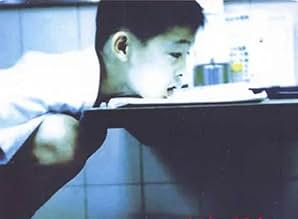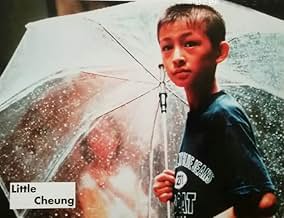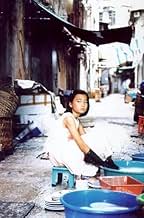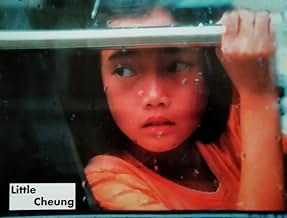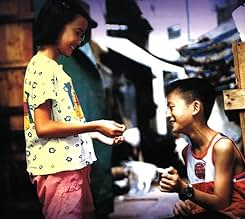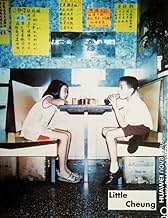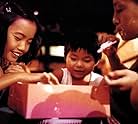अपनी भाषा में प्लॉट जोड़ेंIn 1997, Little Cheung is a street-wise nine-year-old boy living in a bustling neighbourhood of Hong Kong, just before the reunification with China. His parents are always working at their r... सभी पढ़ेंIn 1997, Little Cheung is a street-wise nine-year-old boy living in a bustling neighbourhood of Hong Kong, just before the reunification with China. His parents are always working at their restaurant, so Little Cheung becomes much closer to his grandmother and her Filipino maid A... सभी पढ़ेंIn 1997, Little Cheung is a street-wise nine-year-old boy living in a bustling neighbourhood of Hong Kong, just before the reunification with China. His parents are always working at their restaurant, so Little Cheung becomes much closer to his grandmother and her Filipino maid Armi. Little Cheung befriends Fan, a girl his age who is an illegal immigrant from China. H... सभी पढ़ें
- पुरस्कार
- 6 जीत और कुल 10 नामांकन
- David
- (as Robby)
- Kenny
- (as Teoh Chang)
- Fan's Father
- (as Vincent Wong-Ming)
फ़ीचर्ड समीक्षाएं
Started with 'Made in Hong Kong'(1997), Chan's small budgeted Hong Kong trilogy series have been the most heart-touching movies. In Chan's movie, you're confronted with hard-working, low-earning people live behind the sky high buildings in this capitalistic island of Oriental Pearl. Most dream dies as the day goes by.
'Durian,Durian' is also a must see.
While "Made in Hong Kong" was about the youth of Hong Kong's doomed attitude towards the "handover" and "The Longest Summer" was about how Hong Kong citizens who worked for the British and were more British by heart had to deal with the sudden change in both the social and political spectrum, "Xilu xiang" is taken from a child's point of view and how the child views the "handover". What was more interesting and different about "Xilu xiang" than the other two films in the trilogy was that this film not only incorporated the Hong Kong citizen's point of view towards the "handover", it also looked at the point of view from the Chinese mainlander, as the first half was narrated by Xilu Xiang while the second half was narrated by A Fen. One could easily spot the change in the attitude of the people between the two plots.
This film focused on the interaction between Hong Kong citizens and the Chinese mainlanders, two people, though close geographically, but in fact were very different culturally and ideologically. The mainlanders feared being found out as illegal immigrants, while the Hong Kong citizens held a distrust towards the mainlanders. The children, on the other hand, did not see any differences between themselves and they were able to become close friends. However, the events and people around them forced them to end their friendship and to be apart. Thus, no matter how hard the people try, they could not get along.
The beauty of the film is that the two children, Xilu Xiang and A Fen, saw all the changes in Hong Kong before the "handover" as it affects even their everyday life. Yet, because of their youth and innocence, they did not completely understand them and the significance of the events as they unfolded. They had their own commentary, but they were only able to take note of the mundane and interesting details. However, the audiences, on the other hand, were more affected and touched more emotionally that these children seeing the same images that these children see. The audiences were treated to a very different cinematic experience, as not only were they able to see how the children view the "handover" and treasure and smile at their innocence, they were also able to exert their own view at the same time. Two very different views forming at the same time, simultaneously but yet not overpowering one another. Only one word to describe it: amazing.
There were no main stream Hong Kong actors in this film, though the child who portrayed the title character won the Taiwan Golden Horse award, the Asian equivalent to the Oscars, for best new comer for this role. Thus, the director and the screenwriter, Friut Chan, might be the biggest draw. If you are not a big film bluff and not in touch with the "handover", this film might be hard to understand because it tends to be confusing with images and events flying at you from all directions and there were many hidden meanings. I had to change this review couple of times because I remembered things as I was writing. Otherwise, this film is a must see. Gives you a different and new cinematic experience.
Chan's style is bare and touching, and has a tone that is neither moralistic or judging - no small achievement for a movie that aims to be a social commentary. It simply protriats the tough reality of life through the eyes of a young boy whose goal in life, like most Hong Kong people, is to make more money and satisfy their materialistic needs. Everything else that may touch one's own deeper inner feelings is underplayed or simply hidden.
Although none of the actors in the film is professional, the acting, especially the boy who played "Little Cheung", is superb. There are many references to local culture that may be difficult for non-native audiences, and there are also hints of storylines that come from the two other films ("The longest summer" and "Durian Durian"). But for anyone who wishes to go behind the Hong Kong "genre" and get a real sense of how Hong Kong people live, Fruit Chan's films are excellent starting points.
क्या आपको पता है
- कनेक्शनRemake of Xi lu xiang (1950)
टॉप पसंद
विवरण
बॉक्स ऑफ़िस
- दुनिया भर में सकल
- $29,172
इस पेज में योगदान दें



